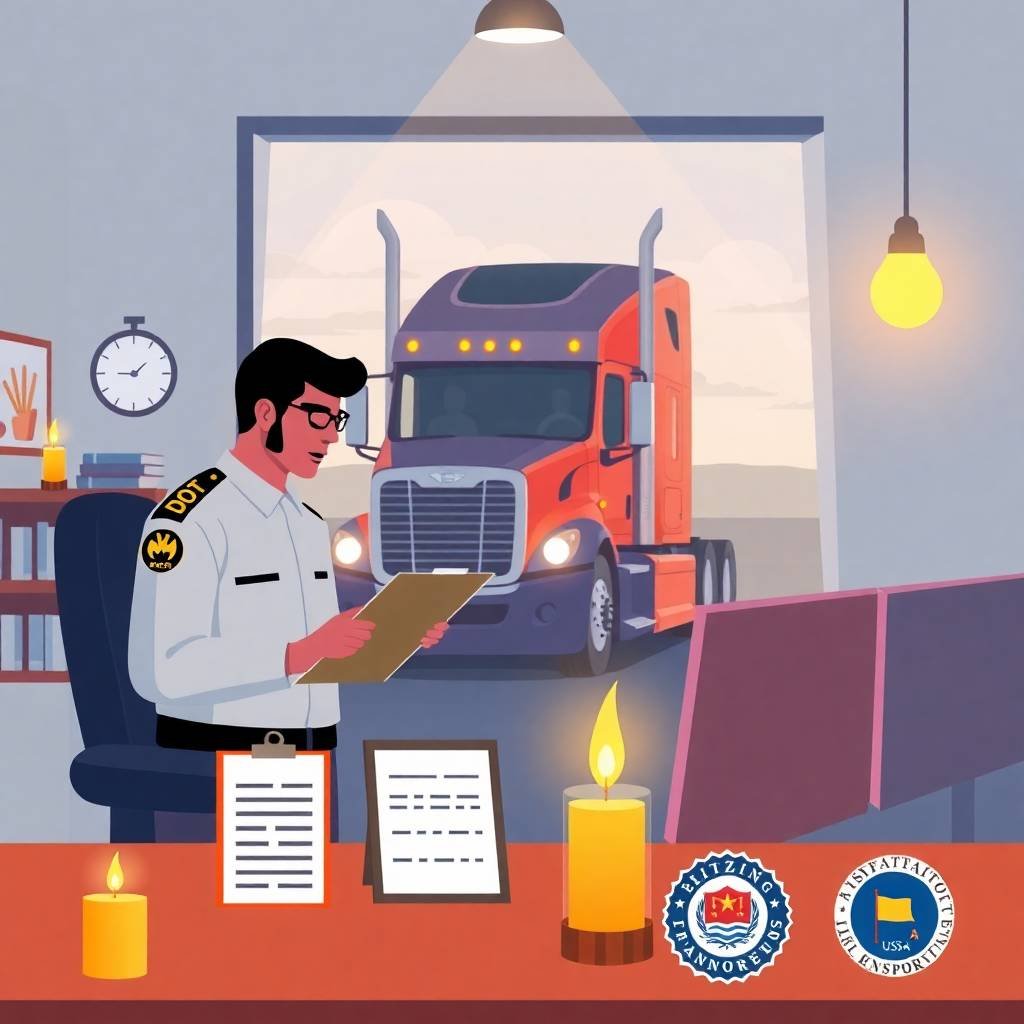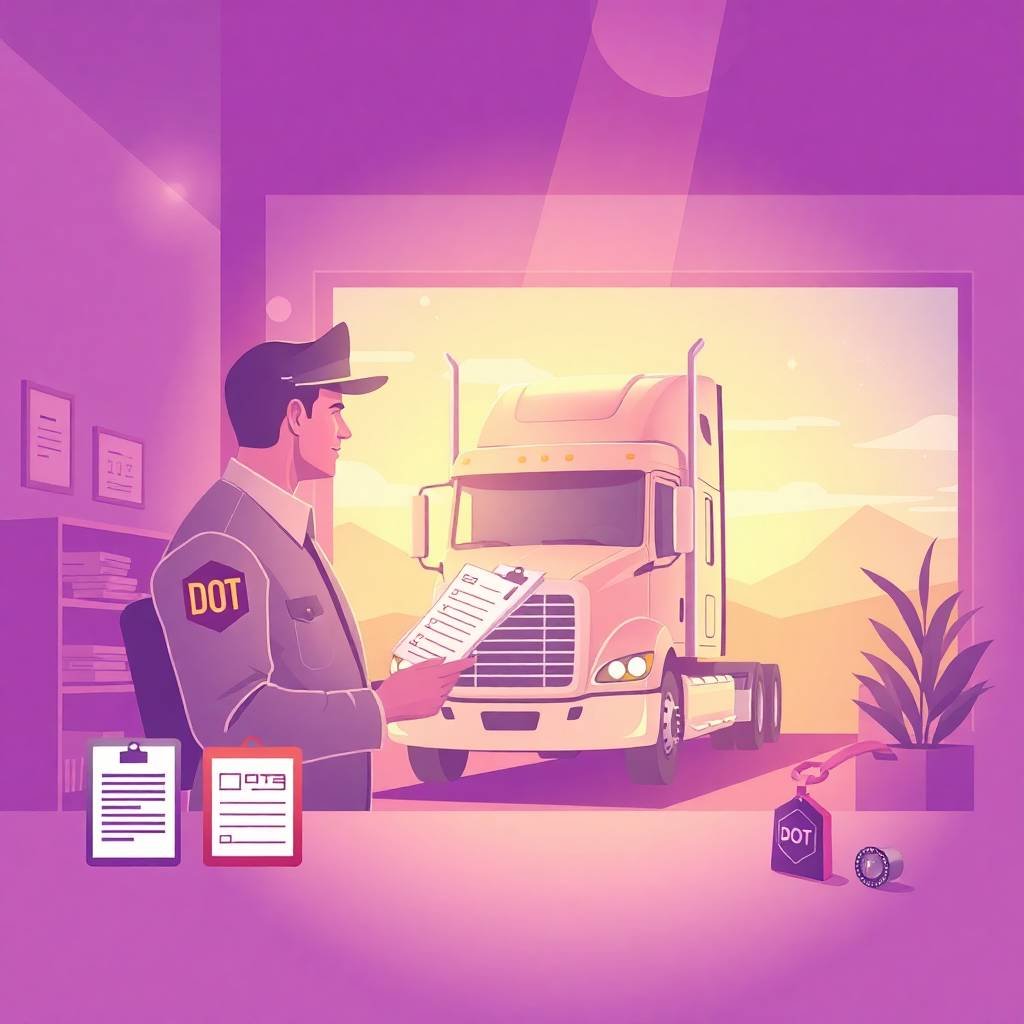1. Missing the UCR Filing Deadlines Altogether
Failing to comply with UCR Filing Deadlines can lead to more than just minor inconveniences—it can trigger a cascade of fines, penalties, and operational interruptions for motor carriers. The Unified Carrier Registration (UCR) program is a federally mandated system that applies to both interstate motor carriers and brokers. Missing these annual deadlines not only puts your company at risk but also raises red flags during DOT audits and roadside inspections.
The High Cost of Missing the Deadline
Missing UCR Filing Deadlines can result in serious consequences, including enforcement actions such as vehicle detentions and out-of-service orders. State and federal agencies like the FMCSA and U.S. Department of Transportation routinely conduct roadside inspections and compliance reviews. If your UCR registration is not current, you’re opening the door to escalated scrutiny and potential violations.
If you’ve already missed the deadline, it’s crucial to act quickly. Schedule a compliance consultation to address the issue before it spirals out of control.
How UCR Violations Affect Compliance Records
When UCR Filing Deadlines are missed, they can impact your overall compliance standing, which is closely tied to your FMCSA Safety Measurement System (SMS) scores. These scores influence insurance rates, customer trust, and even your ability to win contracts. For a more detailed understanding of how these violations integrate with other FMCSA regulations, explore FMCSA Compliance Mistakes and FMCSA Compliance Requirements for Trucking Companies.
More Than Just Missed Payments
Missing UCR Filing Deadlines is often a symptom of deeper compliance issues. It can indicate potential lapses in Driver Qualification File (DQ) management, Drug and Alcohol Testing Compliance, or a lack of DOT Audit Preparation. Fortunately, solutions exist. Trucking companies can take advantage of our UCR Filing Assistance Services or get help with DQ File Setup and Monitoring to ensure full regulatory compliance.
Stay Ahead with Proactive Compliance Support
Navigating UCR regulations doesn’t have to be overwhelming. At Truckers Compliance Hub, we provide dedicated support to help carriers stay on top of UCR Filing Deadlines and other key compliance areas. Whether you’re seeking DOT Compliance Checklists, Pre-Employment DOT Drug Testing Requirements, or Random DOT Drug Testing Requirements, we have you covered.
You can also explore our range of services, including:
For more helpful information, check out:
- FMCSA Compliance Help for Trucking Companies
- FMCSA Compliance Services for Owner Operators
- Owner-Operator Compliance Support
Final Thoughts
Avoiding or overlooking UCR Filing Deadlines can cost your business time, money, and credibility. Don’t wait for enforcement officers to remind you—take proactive steps now. Start by reviewing FMCSA Clearinghouse Compliance and Driver Drug and Alcohol Testing Programs to shore up your weak points.
For more insight, visit our Disclaimer, Privacy Policy, and Terms of Service.
Stay informed. Stay compliant. And never miss your UCR Filing Deadlines again.

2. Assuming UCR Filing Isn’t Required for Your Operation
Many motor carriers and owner-operators mistakenly believe that UCR Filing Deadlines don’t apply to their operations. This assumption often leads to non-compliance, steep fines, and increased scrutiny from enforcement agencies like the Federal Motor Carrier Safety Administration (FMCSA) and the U.S. Department of Transportation (DOT). If you’re crossing state lines with a commercial vehicle, even if you aren’t transporting freight, you’re likely subject to UCR Filing Deadlines.
The Myth: “I Don’t Need to File UCR”
One of the most common misconceptions is that only for-hire carriers need to file under the Unified Carrier Registration system. In reality, UCR Filing Deadlines apply to both for-hire and private carriers, brokers, freight forwarders, and leasing companies operating interstate. If you assume UCR doesn’t apply to your operation, you risk enforcement actions and non-compliance penalties that can affect your FMCSA Safety Measurement System (SMS) scores and business reputation.
Learn more about typical misunderstandings in FMCSA Compliance Mistakes.
Understanding Who Needs to File
If your commercial vehicle has a gross vehicle weight rating (GVWR) of 10,001 pounds or more and crosses state lines, UCR Filing Deadlines are not optional. You must comply, even if you’re not transporting cargo or charging for services. To ensure you fall within UCR requirements, review your operation’s details against the official compliance criteria. For assistance, explore our UCR Filing Assistance service.
To view the latest industry updates, visit the Truckers Compliance Hub blog.
The Compliance Ripple Effect
Failing to meet UCR Filing Deadlines often correlates with other compliance oversights such as incomplete Driver Qualification Files, ignored Drug and Alcohol Testing Compliance, and poor DOT Audit Preparation. Our services, including DQ File Setup and Monitoring and Drug and Alcohol Testing Management, can help you streamline these responsibilities.
Make sure your operation is covered by referencing the DOT Compliance Checklist and these valuable guides:
- FMCSA Clearinghouse Compliance
- Driver Drug and Alcohol Testing Program
- DQ File Violations and FMCSA Penalties
Don’t Assume — Get Help
To avoid assumptions and ensure your business complies with UCR Filing Deadlines, schedule a consultation with a compliance specialist. We offer customized support for both trucking companies and owner-operators. If you also manage IFTA, IRP, or BOC-3 filings, check out our IFTA, IRP & BOC-3 Support.
Need more help staying compliant year-round? Our full compliance solutions for owner-operators are designed to cover every angle of your regulatory obligations.
Final Thoughts
Assuming you’re exempt from UCR Filing Deadlines can be a costly mistake. UCR compliance is a foundational aspect of running a legitimate and successful interstate operation. Don’t wait until you’re facing fines or out-of-service orders—be proactive and ensure you meet all regulatory requirements.
To learn more, read our Disclaimer, Privacy Policy, and Terms of Service.

3. Delaying Until the Last Minute
Every year, thousands of motor carriers scramble to meet UCR Filing Deadlines just days—or even hours—before the cutoff. While it may seem harmless to delay, waiting until the last minute to comply with Unified Carrier Registration (UCR) requirements can lead to costly mistakes, penalties, and administrative headaches.
When dealing with federal agencies like the Federal Motor Carrier Safety Administration (FMCSA) and the Department of Transportation (DOT), procrastination can threaten your entire operation’s compliance.
What Happens When You Wait Too Long?
Delaying UCR filing invites unnecessary risk. Many trucking companies underestimate the time needed to ensure that every piece of information is accurate and up to date. When UCR Filing Deadlines approach, systems may be overwhelmed, support lines may be backlogged, and you’ll have less time to correct errors.
Waiting too long can also result in enforcement actions, such as fines or out-of-service orders, which affect your FMCSA Safety Measurement System (SMS) scores. Mistakes made in haste often lead to FMCSA compliance violations, impacting everything from audits to insurance premiums.
UCR Filing Deadlines and Their Ripple Effect
Putting off UCR filing often signals a deeper issue: disorganized compliance processes. Companies who delay may also struggle with other regulatory responsibilities like Driver Qualification File Requirements, DOT Drug and Alcohol Testing Programs, or DQ File Violations.
To avoid these issues, explore our UCR Filing Assistance and DOT Audit Preparation services. We also offer Drug and Alcohol Testing Management and DQ File Setup and Monitoring to help you stay proactive.
Stop Scrambling — Start Planning
The best way to meet UCR Filing Deadlines without stress is to prepare early. Use resources like our DOT Compliance Checklist to get organized, and reference FMCSA Compliance Requirements to understand your full obligations.
If you’re unsure where to start, schedule a one-on-one appointment with a compliance specialist. We tailor our guidance for trucking companies and owner-operators, offering full support for tasks like IFTA, IRP, and BOC-3.
Stay informed by browsing the latest updates on the Truckers Compliance Hub Blog. Learn more about related topics like FMCSA Clearinghouse Compliance, Pre-Employment DOT Drug Testing Requirements, and Random DOT Drug Testing Requirements.
Avoid the Pitfalls of Procrastination
Meeting UCR Filing Deadlines shouldn’t be a last-minute task. The risks of fines, lost time, and operational interruptions are far greater than the small effort it takes to file early. Whether you run a fleet or drive solo, compliance starts with planning—not panicking.
For peace of mind, review our Disclaimer, Privacy Policy, and Terms of Service. Start today, and avoid becoming another cautionary tale of last-minute non-compliance.

4. Using Inaccurate Fleet Size During Registration
For motor carriers, getting the UCR Filing Deadlines right is only half the battle. Equally critical is ensuring that the information submitted—particularly your fleet size—is 100% accurate. Misreporting the number of vehicles during UCR registration can trigger unnecessary fines, compliance issues, and DOT audits. Whether intentional or accidental, inaccurate fleet reporting raises red flags with regulatory agencies like the FMCSA and the Department of Transportation.
Why Accurate Fleet Size Matters
UCR fees are based on the size of your fleet. If you underreport, you may pay less upfront, but you risk severe penalties if the discrepancy is discovered. Overreporting, on the other hand, means you’re unnecessarily overpaying each year. Either way, failure to provide an accurate fleet count by the UCR Filing Deadlines creates problems that go beyond financial loss.
Accurate reporting directly affects your FMCSA Safety Measurement System (SMS) scores, and a mismatch between UCR filings and other compliance records—like your Driver Qualification Files or Drug and Alcohol Testing Compliance—can lead to FMCSA compliance mistakes.
The Link Between UCR Accuracy and Broader Compliance
Misreporting fleet size may also signal issues with your overall compliance management. Carriers who rush through UCR filing without verifying fleet details often neglect other key requirements like DQ File Violations, Clearinghouse Compliance, or Pre-Employment DOT Drug Testing.
A comprehensive approach to compliance starts with organization. Our DOT Compliance Checklist and DOT Audit Preparation resources can help you get there.
UCR Filing Deadlines: Why You Shouldn’t Wait
Don’t assume you have time to fix errors later. Once UCR Filing Deadlines pass, it becomes harder to make corrections without drawing regulatory attention. Avoid issues by using our UCR Filing Assistance service to ensure your fleet size and payment tier are correct the first time.
We also offer DQ File Setup and Monitoring, Drug and Alcohol Testing Management, and IFTA/IRP/BOC-3 Support to streamline all your compliance needs.
Schedule Help Before It’s Too Late
If you’re unsure how to report your fleet correctly or want to avoid penalties tied to UCR Filing Deadlines, schedule an appointment with our compliance experts today.
For more guidance, visit our homepage at Truckers Compliance Hub or explore valuable posts such as:
- FMCSA Compliance Requirements for Trucking Companies
- Random DOT Drug Testing Requirements
- Driver Drug and Alcohol Testing Program
- FMCSA Compliance Help for Trucking Companies
- FMCSA Services for Owner-Operators
Protect Your Business by Filing Accurately
Getting ahead of UCR Filing Deadlines means more than just being on time—it means being precise. Inaccuracies can trigger compliance reviews, overpayment, or worse. Trust your filings to experienced professionals who understand the complexities of FMCSA regulations.
For legal transparency, please review our Disclaimer, Privacy Policy, and Terms of Service.

5. Failing to Update Company Information Before Filing
In the fast-paced world of trucking and transportation, one seemingly minor mistake—failing to update company information—can trigger a cascade of compliance issues. With UCR Filing Deadlines approaching each year, motor carriers must ensure that all company data is accurate and up to date before submitting their Unified Carrier Registration. Failing to do so can lead to rejected filings, fines, and red flags from regulators like the FMCSA and the U.S. Department of Transportation.
Why Accuracy Matters Before UCR Filing
Before submitting anything related to UCR Filing Deadlines, ensure that your business name, address, number of power units, and operating status are correct across all FMCSA databases. Any inconsistencies may cause errors in your UCR Filing Assistance, delay your registration, or result in paying the wrong fee tier—each of which can negatively impact your DOT compliance profile.
This type of oversight is commonly found during DOT audits and can compound other problems, such as DQ File Violations and missing Drug and Alcohol Testing Compliance. Review our full DOT Compliance Checklist to make sure you’re not missing essential updates before your next filing.
The Domino Effect of Inaccurate Filings
Failing to update company details prior to UCR Filing Deadlines can lead to additional problems like failed DOT audit preparation or discrepancies in your FMCSA Safety Measurement System (SMS) score. Worse, errors in your filings may expose your business to FMCSA compliance mistakes and noncompliance findings that could otherwise be avoided.
How to Stay Ahead of UCR Filing Deadlines
To stay compliant, begin preparations well before the annual UCR Filing Deadlines. Use tools like our DQ File Setup and Monitoring service and Drug and Alcohol Testing Management to keep your records current. For fleet operators also dealing with Pre-Employment and Random DOT Drug Testing Requirements, accuracy across the board is essential.
Our IFTA/IRP/BOC-3 Support ensures that all your state and federal filings are aligned before your UCR is submitted. This comprehensive approach helps reduce stress as deadlines loom and lets you focus on operations.
Ready for Professional Help?
Avoid unnecessary penalties by verifying your company’s information well ahead of the UCR Filing Deadlines. If you’re unsure where to start, schedule an appointment with our compliance team for tailored guidance.
You can also explore our full list of compliance insights at Truckers Compliance Hub, including key posts such as:
- FMCSA Compliance Requirements for Trucking Companies
- Driver Drug and Alcohol Testing Program
- FMCSA Clearinghouse Compliance
For tailored resources, visit:
- FMCSA Compliance Help for Trucking Companies
- FMCSA Services for Owner Operators
- FMCSA Compliance Services for Owner Operators 2
Final Note
Take the time to cross-check all company details before filing. It may seem minor, but small discrepancies can turn into major setbacks. For legal and operational transparency, review our Disclaimer, Privacy Policy, and Terms of Service to better understand your responsibilities.

6. Believing UCR Is Automatically Renewed
Each year, thousands of motor carriers mistakenly believe their Unified Carrier Registration (UCR) will automatically renew. This false assumption can lead to significant compliance issues, especially as UCR Filing Deadlines approach. Unlike vehicle registration or insurance policies that offer auto-renewal options, UCR must be manually filed and paid annually.
Missing this crucial filing not only leads to fines and penalties but can also result in enforcement actions from the FMCSA or state agencies. To help carriers avoid costly oversights, it’s important to fully understand the process and take action before UCR Filing Deadlines close.
UCR Filing Is Not Automatic
Many owner-operators and fleet managers assume their UCR will carry over from the previous year. This is one of the most common FMCSA compliance mistakes. In reality, UCR must be filed manually each year based on the number of power units in your fleet. If your company fails to act by the UCR Filing Deadlines, you may be subject to penalties during roadside inspections or audits.
To avoid delays and confusion, review your business profile before filing. Ensure your data matches what is on file with the U.S. Department of Transportation and update your MCS-150 if needed. A full DOT Compliance Checklist can help ensure you’re prepared.
Why UCR Compliance Matters
Missing the UCR Filing Deadlines may trigger a chain of compliance issues. For example, errors in fleet size can conflict with your Driver Qualification File requirements or reflect poorly in your FMCSA Safety Measurement System (SMS) scores. Worse yet, it could raise red flags during a DOT audit.
That’s why our UCR Filing Assistance service is designed to help carriers meet annual deadlines with accuracy. Whether you’re an owner-operator or managing a larger fleet, our support ensures you stay compliant with UCR and other FMCSA requirements like DQ File Setup and Monitoring, Drug and Alcohol Testing Management, and IFTA/IRP/BOC-3 Support.
Stay Ahead of UCR Filing Deadlines
Instead of scrambling at the last minute, use this 30-minute consultation link to schedule time with a compliance specialist. We’ll review your data and walk you through the necessary steps to stay ahead of the UCR Filing Deadlines.
You can also browse Truckers Compliance Hub to access vital resources including:
- FMCSA Compliance Requirements for Trucking Companies
- FMCSA Clearinghouse Compliance
- Driver Drug and Alcohol Testing Program
- Drug and Alcohol Testing Compliance
We also provide advanced guidance for:
Protect Your Business
Never assume UCR filing happens automatically. Avoid mistakes by confirming your registration before UCR Filing Deadlines and staying proactive about your compliance. For more information, read our Disclaimer, Privacy Policy, and Terms of Service.

7. Confusing UCR With Other FMCSA Requirements
For trucking companies and owner-operators alike, navigating federal compliance can be overwhelming. One common mistake that leads to serious consequences is confusing the Unified Carrier Registration (UCR) with other Federal Motor Carrier Safety Administration (FMCSA) requirements. This misunderstanding often causes carriers to miss critical UCR Filing Deadlines, which can result in penalties and enforcement action.
Understanding the distinction between UCR and other FMCSA obligations is essential for staying in compliance and avoiding unnecessary risks.
What UCR Is—and Is Not
The UCR is an annual federal registration required for carriers operating interstate. It is distinct from DOT number registration, MCS-150 updates, or Drug and Alcohol Testing compliance. Many carriers incorrectly assume that completing these other requirements also satisfies UCR, causing them to miss UCR Filing Deadlines.
To clarify, UCR is a fee-based registration system managed separately from the FMCSA’s safety programs, although compliance with both is mandatory. To avoid this confusion, review the DOT Compliance Checklist regularly and ensure you understand where UCR fits in the larger picture.
Common Mistakes and Their Impact
Failing to differentiate UCR from other obligations like DQ File Requirements or FMCSA Clearinghouse Compliance can damage your safety record and financial standing. Missing UCR Filing Deadlines may lead to enforcement actions during roadside inspections, affect your SMS scores, or trigger fines during audits.
These misunderstandings are often highlighted in our reviews of FMCSA Compliance Mistakes and during DOT Audit Preparation.
If you’re unsure about your compliance status, schedule an appointment with a specialist who can guide you before critical UCR Filing Deadlines pass.
UCR and Your Broader Compliance Strategy
Successful carriers treat UCR as just one part of a comprehensive compliance strategy. This includes DQ File Setup and Monitoring, Drug and Alcohol Testing Management, and IFTA/IRP/BOC-3 Support.
You can view the latest insights on these services and regulatory changes at Truckers Compliance Hub, where we also provide tailored help for owner-operators and trucking companies.
Don’t Let UCR Fall Through the Cracks
Missing UCR Filing Deadlines can result in disruptions that cost far more than the registration itself. Our UCR Filing Assistance service ensures you meet the deadline every year, helping you avoid fines and preserve your operating authority.
To learn how we support compliance beyond UCR, explore:
- FMCSA Compliance Services for Owner-Operators
- Pre-Employment DOT Drug Testing Requirements
- Random DOT Drug Testing Requirements
- Driver Drug and Alcohol Testing Program
For government-issued guidelines, refer to the U.S. Department of Transportation and the official FMCSA site.
Stay Protected and Informed
To keep your operation safe from noncompliance, ensure UCR is on your radar and filed before UCR Filing Deadlines. For support or a personalized compliance review, book a consultation today.
Before working with us, please review our Disclaimer, Privacy Policy, and Terms of Service.

8. Overlooking Multi-State Operation Requirements
Operating across state lines brings growth opportunities, but it also introduces regulatory complexity that many carriers underestimate. A common pitfall among motor carriers and owner-operators is overlooking multi-state operation requirements, particularly when it comes to UCR Filing Deadlines.
Understanding how interstate operations impact your compliance obligations is critical to avoiding fines, audits, and even shutdowns.
What Are Multi-State Operation Requirements?
When your commercial vehicle travels across state lines, you’re subject to specific federal and state regulations. One of the most commonly misunderstood aspects of interstate compliance is the Unified Carrier Registration (UCR). Many carriers assume they’re automatically covered, but missing UCR Filing Deadlines can result in costly enforcement actions.
Unlike state-specific DOT registrations, the UCR program applies to all carriers that engage in interstate commerce. The registration must be renewed annually, and UCR Filing Assistance can help you stay ahead of these critical deadlines.
The Risk of Noncompliance
Failure to comply with multi-state operation rules can trigger audits and affect your company’s Safety Measurement System (SMS) scores. Late or incomplete UCR filings are among the top FMCSA compliance mistakes. Missing UCR Filing Deadlines can also lead to out-of-service orders and fines during roadside inspections.
To protect your operation, refer to the DOT Compliance Checklist and keep track of additional requirements such as Driver Qualification File Requirements, DQ File Violations, and your Pre-employment DOT Drug Testing Requirements.
Staying Ahead of UCR Filing Deadlines
UCR registration does not renew automatically. Many carriers mistakenly believe that once they register, they’re covered indefinitely. In reality, UCR Filing Deadlines come around every year and apply to carriers, brokers, and freight forwarders alike. To avoid penalties, schedule an appointment with a compliance expert who can walk you through your multi-state obligations.
To understand the government’s requirements, consult the Federal Motor Carrier Safety Administration (FMCSA) and the U.S. Department of Transportation.
Comprehensive Compliance Support
Interstate carriers must juggle many responsibilities beyond UCR. These include Drug and Alcohol Testing Compliance, Random DOT Drug Testing Requirements, and Driver Drug and Alcohol Testing Programs. Missing any of these can be just as damaging as ignoring UCR Filing Deadlines.
Our full suite of services includes DOT Audit Preparation, DQ File Setup and Monitoring, Drug and Alcohol Testing Management, and IFTA/IRP/BOC-3 Support.
For the latest updates, visit Truckers Compliance Hub and explore resources tailored for trucking companies and owner-operators.
Avoid Costly Mistakes
Staying compliant across state lines demands vigilance. Don’t let UCR Filing Deadlines or other regulatory oversights threaten your operation. Whether you’re preparing for a DOT audit or managing your FMCSA Clearinghouse Compliance, we’re here to help.
Before getting started, review our Disclaimer, Privacy Policy, and Terms of Service.

9. Relying on Unverified Third-Party Filers
As the transportation industry becomes more complex, many motor carriers turn to third-party companies for help managing compliance. While this can save time, relying on unverified third-party filers for critical processes like Unified Carrier Registration (UCR) can lead to costly consequences — especially when UCR Filing Deadlines are missed.
UCR Filing Deadlines Are Non-Negotiable
Missing UCR Filing Deadlines is a serious compliance issue. The FMCSA and state enforcement agencies expect all interstate carriers to register annually, and failure to meet these deadlines can result in roadside violations, fines, and even operational suspension.
Unfortunately, many carriers trust third-party services without verifying their credentials. These filers often lack proper compliance experience, and in some cases, they charge excessive fees or never submit the filings at all. To ensure you’re not falling victim to these pitfalls, it’s important to work only with trusted compliance partners like Truckers Compliance Hub, where experienced professionals offer verified UCR Filing Assistance.
Why Verification Matters
Carriers must remain vigilant when choosing compliance partners. Verified service providers help you manage not only UCR Filing Deadlines, but also other critical regulatory requirements such as Driver Qualification File Requirements, DOT Compliance Checklists, and Drug and Alcohol Testing Compliance.
Without these safeguards, you’re exposed to FMCSA compliance mistakes that can escalate into larger issues — from missed DOT audit preparation to violations discovered during safety inspections under the FMCSA Safety Measurement System (SMS).
Don’t Gamble With Compliance
Your business deserves more than a generic filing service. Our team offers full-service compliance support including DQ File Setup and Monitoring, Drug and Alcohol Testing Management, and IFTA/IRP/BOC-3 Support.
Additionally, navigating FMCSA Clearinghouse Compliance, Pre-employment DOT Drug Testing Requirements, and Random DOT Drug Testing Requirements becomes easier with trusted experts.
If you’re unsure whether your current third-party filer is reliable, schedule an appointment for a personalized compliance review.
Resources for Smart Carriers
Beyond managing UCR Filing Deadlines, comprehensive FMCSA compliance also includes avoiding DQ File Violations, maintaining a proper Driver Drug and Alcohol Testing Program, and understanding FMCSA Compliance Requirements for Trucking Companies.
Explore more helpful guides for trucking companies and owner-operators to stay on track. You can also review the FMCSA and U.S. Department of Transportation websites for updated federal guidelines.
For our terms and policies, please refer to our Disclaimer, Privacy Policy, and Terms of Service.
Missing UCR Filing Deadlines due to unreliable third-party filers isn’t just a minor mistake—it’s a risk to your livelihood. Trust only verified experts to protect your business and keep your trucks on the road.

10. Ignoring UCR Audit Risks After Late or Faulty Filing
Many motor carriers mistakenly assume that missing or improperly handling UCR Filing Deadlines is a minor issue. In reality, such oversights can lead to serious audit risks from state and federal agencies. Understanding the consequences of noncompliance is essential to protect your authority, avoid penalties, and ensure long-term operational success.
Why UCR Filing Deadlines Matter
The Unified Carrier Registration (UCR) program mandates that all carriers operating interstate comply annually with registration and fee payment requirements. Missing UCR Filing Deadlines not only results in late fees and citations but also significantly increases your likelihood of being audited.
When states detect inconsistent filings or notice delays, they may flag your operation for closer review. A faulty filing can trigger a broader investigation into your FMCSA compliance, including Driver Qualification File violations, DOT drug and alcohol testing compliance, and DQ file setup.
UCR Mistakes Often Lead to Broader Compliance Audits
A late or incorrect UCR filing can be the starting point of a DOT audit or an FMCSA safety review. These audits don’t just check your UCR history — they assess your readiness using systems like the FMCSA Safety Measurement System (SMS), which tracks violations, inspections, and compliance behavior.
Failing to meet UCR Filing Deadlines can therefore lead to a chain reaction of compliance problems, ranging from random DOT drug testing requirement failures to issues flagged during your driver drug and alcohol testing program.
How to Prevent UCR Audit Triggers
To stay compliant and avoid unnecessary audits, it’s essential to use a trusted partner for UCR Filing Assistance. Truckers Compliance Hub helps carriers meet UCR Filing Deadlines accurately and on time, while also managing other vital areas of compliance like DOT audit preparation, drug and alcohol testing management, and IFTA/IRP/BOC-3 support.
For a detailed consultation on your compliance standing, schedule an appointment today and avoid the audit risks that come with neglecting UCR Filing Deadlines.
Stay Ahead of Compliance Risks
Managing compliance doesn’t end with UCR. It involves tracking FMCSA Clearinghouse Compliance, ensuring pre-employment DOT drug testing, and staying current with the DOT Compliance Checklist. Failing to follow through in these areas magnifies the risks associated with late UCR filings.
Explore additional compliance solutions for owner-operators and trucking companies to streamline your operations.
For official guidance, visit the FMCSA and U.S. Department of Transportation.
Legal and Policy Information
For details about our services, read our Disclaimer, Privacy Policy, and Terms of Service.
Ignoring UCR Filing Deadlines doesn’t just create paperwork issues — it puts your entire business at risk. Make compliance a priority before it becomes a liability.

What happens if I miss the UCR Filing Deadlines?

Missing UCR Filing Deadlines can lead to costly penalties, enforcement actions, and even out-of-service orders during roadside inspections. To avoid these consequences, it’s crucial to file accurately and on time. If you’re unsure how to proceed, UCR filing assistance services are available to help you meet all required deadlines and stay in compliance.
Do I need to file UCR if I operate only within one state?

If your operations cross state lines or your vehicles are involved in interstate commerce—even if briefly—you are likely required to comply with UCR Filing Deadlines. Many intrastate carriers mistakenly believe they’re exempt. For support in determining your compliance needs and avoiding errors, consider consulting our IFTA, IRP, and BOC-3 support services.
Can I rely on a third party to handle my UCR Filing?

While third-party providers can assist with filing, not all are reliable. Inaccurate submissions or missed UCR Filing Deadlines caused by unqualified filers can lead to major compliance issues. Ensure you’re working with experienced professionals like those at Truckers Compliance Hub, who also offer DOT audit preparation services to safeguard your operations.
How often must I file under UCR regulations?

UCR Filing Deadlines recur annually, and there is no auto-renewal—each year requires a new submission. Missing your annual deadline could mean fines or citations. To keep your entire compliance portfolio organized, including filings and driver qualifications, our DQ File Setup and Monitoring services can help maintain your readiness year-round.
Is UCR compliance connected to other DOT requirements?

Yes, UCR Filing Deadlines are just one piece of the DOT compliance puzzle. Other requirements such as drug and alcohol testing, driver qualification files, and audit preparation all contribute to your overall safety profile. We recommend bundling your UCR efforts with other services like Drug and Alcohol Testing Management to ensure full compliance and peace of mind.
Igor Iturriaga is a transportation compliance expert and founder of Dynamic 305 Miami LLC. He helps owner-operators and fleets stay FMCSA-compliant and audit-ready. https://www.linkedin.com/in/igor-iturriaga-64503217/
